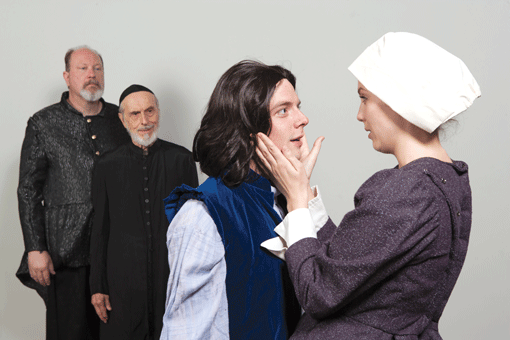David Ives’ play, New Jerusalem, engages the audience during a historic legal interrogation
By DORIS RUBENSTEIN
What do the portrayals of Wolfgang Mozart in Amadeus and Baruch de Spinoza in New Jerusalem have in common? In both plays, the main characters are child prodigies and they are both depicted as sort of wild and crazy guys.
Much more is known about Mozart’s early life than about Spinoza’s life. David Ives’ play, New Jerusalem, The Interrogation of Baruch de Spinoza at Talmud Torah Congregation: Amsterdam, July 27, 1656, now on stage at Minnesota Jewish Theatre Company’s Hillcrest Theater in St. Paul, attempts to fill in some of that gap.
The play’s mood is set before the houselights are even dimmed when the muffled voices of a sizeable crowd bleed through the sound system (creatively used by sound designer C. Andrew Mayer), melding with the voices of the audience that is just being seated. It’s a hint to those paying attention that they will become part of the play itself.
New Jerusalem’s main action takes place in the Talmud Torah Synagogue. It imagines what was a legal interrogation — not a religious one, per se, since it is not conducted by a beit din (rabbinical court) — by Talmud Torah’s administrative leaders, ex officio leaders of the Amsterdam Jewish community.
The object of the interrogation is one 22-year-old member of the community: Baruch de Spinoza. The audience is the Talmud Torah congregation, witnessing the “trial.”

For those familiar with Spinoza’s writings, it may still be hard to comprehend that his philosophy was well developed at such an early age, and even disseminated widely throughout Europe. And that dissemination — long before the Internet — was his real crime, according to the rules by which Jews were forced to play in Holland at that time.
Even as a maturing philosopher, de Spinoza was, in many ways, still a careless youth who did not foresee the consequences of his actions. He sees himself in the larger society as deeply integrated into his Jewish society, but finds it increasingly hard to conform to Orthodox beliefs.
In order to survive, de Spinoza compartmentalizes religious beliefs and his philosophy. It works for him internally, but it doesn’t work for his society — neither the Jewish one nor the Dutch one.
Michael Torsch, a newcomer to MJTC, does an excellent job at combining these two qualities into a believable character. His hairless chin and slight figure emphasize de Spinoza’s youth; his adeptness at memorizing, and then engagingly performing, Ives’ weighty script — which deals with unfamiliar and difficult ideas — is worth an extra round of applause. Kudos to director Kurt Schweickhardt for making such an excellent casting choice.
Similarly, his choice of George Muellner to play Talmud Torah’s Rabbi Saul Levi Mortera was spot-on. Muellner’s pain for his prize pupil’s travails and his destiny are palpable to all in the audience.
Amid all the challenging philosophy, Rachel Weber provides some welcome comic relief as de Spinoza’s half sister Rebekah. James Ramlet, also making his MJTC debut, is an imposing foil to de Spinoza as Abraham Van Valkenburgh, the representative of the Christian burgers of Amsterdam.
Annie Cady’s costumes were a good approximation of Dutch clothing of the era, as seen in many a Rembrandt or Hals painting. Theresa Akers’ scenic design made the move from de Spinoza’s favorite coffeehouse to the interior of Talmud Torah Synagogue easy.
Despite the weight of the play’s subject, the actors keep the audience highly engaged by breaking through the fourth wall regularly. No one nods off when Baruch de Spinoza is on trial.
***
As part of Minnesota Jewish Theatre Company’s 20th anniversary season, New Jerusalem, The Interrogation of Baruch de Spinoza at Talmud Torah Congregation: Amsterdam, July 27, 1656 is on stage through Nov. 9 at the Hillcrest Center Theater, 1978 Ford Pkwy., St. Paul.
For tickets and information, call 651-647-4315 or visit: www.mnjewishtheatre.org.
(American Jewish World, 10.24.14)



















